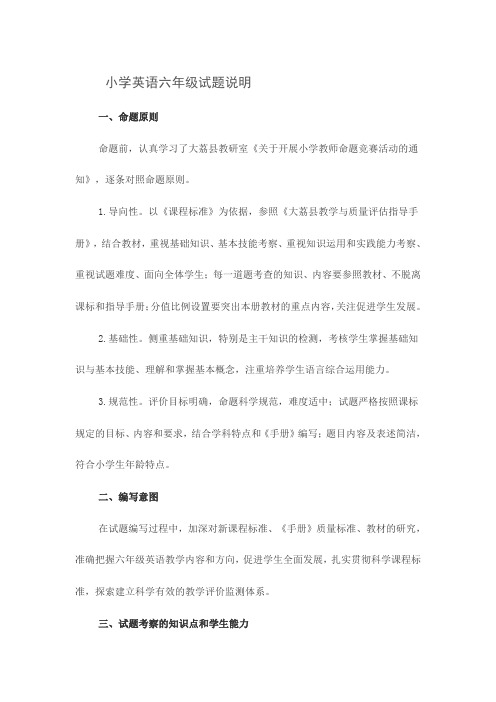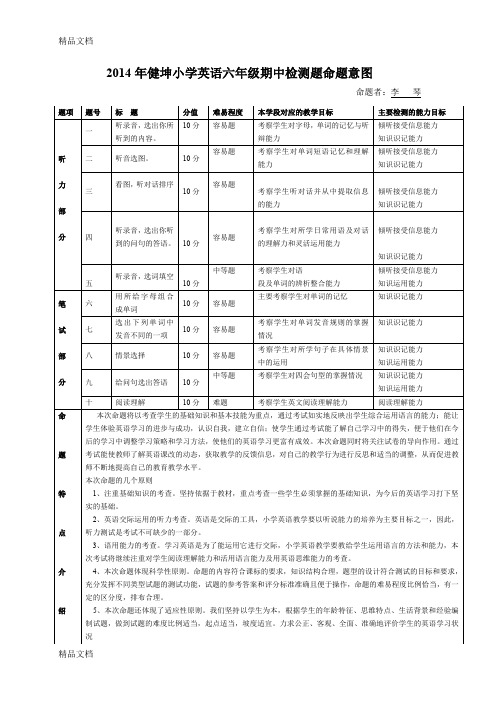最新小学英语六年级命题意图
小学英语作文命题意图

小学英语作文命题意图【中英文版】The title of the elementary English composition prompts holds a significant purpose in guiding young learners" writing skills.It aims to ignite their creativity, foster their ability to express thoughts in written English, and enhance their understanding of various topics.小学英语作文命题旨在引导小学生写作技能的发展,激发他们的创造力,培养他们用英文表达思想的能力,并加深他们对不同主题的理解。
Diverse themes are chosen to cater to the broad interests of children, ensuring that each student can find a niche to pour their imagination into, thus making the writing process an enjoyable and fulfilling experience.选题的多样性是为了迎合孩子们广泛的兴趣,确保每位学生都能找到发挥想象的空间,从而使写作过程成为一种愉悦且充实的体验。
Moreover, the prompts are designed to be age-appropriate, serving as a bridge to connect classroom learning with real-life situations, which helps students to apply what they have learned in a practical context.此外,作文命题还注重适龄性,将课堂学习与实际生活情境联系起来,帮助学生将在课堂上学到的知识运用到实际情境中。
小学英语作文命题意图

小学英语作文命题意图English:The purpose of a primary school English essay prompt is to encourage students to practice and improve their English writing skills. It often requires students to express their thoughts, describe an experience, or tell a story in English, which helps them to not only enhance their language competence but also stimulate their creativity and imagination. Additionally, writing essays on specific topics helps students to organize their thoughts and structure their writing, thus improving their overall communication abilities. Moreover, essay prompts can also be used to assess students' language proficiency and understanding of the topic, providing teachers with valuable insights into each student's learning progress.中文翻译:小学英语作文命题的意图是鼓励学生练习和提高他们的英语写作能力。
通常需要学生用英语表达他们的想法,描述一次经历或讲述一个故事,这有助于他们不仅增强语言能力,而且还能激发他们的创造力和想象力。
PEP小学六年级毕业命题意见

教学导向:培养学生运用所学语言知识完成句子的能力。 教师在教学中要尽量做到在句子中讲解单词。
27
五、Fill in the blanks. ( 用所给词的适当形式填空。)
1.Mary often ________ (get) up at 6:30 in the morning. 2.I am going to ________ (visit) my grandfather next weekend. 3. Last weekend I ________ (go) swimming with my friends.
教学导向:注重培养学生的口语问答能力。
11
针对策略: 第一:在平时教学中,教师可以对形似而 意不同的句子多做比较练习。
例如:1. What would you like? What do you like? 2 . What day is it today? What’s the date today? 3. What do you like best? What’s your favorite …?
28
六、Transform the sentences. (按要求改写 句子。)
1. She feels sick. (就划线部分提问) ________ _________ she feel? 2.I learned English yesterday. (改一般疑问句) _________ you __________ English yesterday? 3. Did you go hiking last month? (肯定回答) Yes, _______ ________.
15
六年级英语命题设计理念说明

六年级英语命题设计理念说明The design of a sixth-grade English curriculum is a critical aspect of a student's educational journey. At this stage, students are transitioning from the foundational years of language learning to a more sophisticated and comprehensive understanding of the English language. The rationale behind the curriculum design must take into account the cognitive development of the students, their prior knowledge, and the ultimate goals of English language proficiency.Firstly, the curriculum must be aligned with the cognitive abilities of sixth-grade students. At this age, students are beginning to develop abstract thinking skills and are capable of engaging in more complex language tasks. The curriculum should capitalize on this cognitive growth by introducing more challenging reading materials, writing assignments, and grammar concepts. For instance, students can be exposed to a wider range of literary genres, including novels, short stories, and poetry, which require deeper analysis and interpretation. Additionally, the writing assignments can focus on developing more sophisticated organizational structures, such as persuasive essays and research papers, rather than solely relying on basic narrative ordescriptive writing.Secondly, the curriculum should build upon the students' prior knowledge of the English language. In the earlier grades, students have acquired foundational skills in areas such as phonics, vocabulary, and basic grammar. The sixth-grade curriculum should seamlessly integrate these foundational skills into more advanced language learning. For example, students can be encouraged to apply their knowledge of word roots, prefixes, and suffixes to decipher the meaning of unfamiliar vocabulary in their reading and writing. Similarly, the grammar instruction can focus on more complex sentence structures and grammatical concepts, building upon the basic skills acquired in previous years.Thirdly, the curriculum should be designed with the ultimate goal of English language proficiency in mind. This means that the content and activities should be structured to develop the four core language skills: reading, writing, listening, and speaking. The curriculum should provide ample opportunities for students to practice and refine these skills through a variety of engaging and relevant tasks. For instance, the reading component can include a mix of fiction and non-fiction texts, challenging students to comprehend and analyze different genres. The writing component can incorporate various forms of written expression, such as creative writing, research-based essays, and persuasive arguments. The listening and speaking componentscan be strengthened through activities like class discussions, oral presentations, and interactive language games.Moreover, the curriculum should be designed to foster the development of critical thinking and problem-solving skills. These higher-order skills are essential for students to effectively navigate the complexities of the English language and to apply their knowledge in real-world contexts. The curriculum can incorporate tasks that require students to analyze, evaluate, and synthesize information, as well as to formulate and defend their own opinions and ideas.Additionally, the curriculum should be responsive to the diverse needs and learning styles of the students. This can be achieved through the incorporation of differentiated instruction, where teachers adapt their teaching methods and materials to cater to the individual needs of their students. This may involve providing alternative resources, adjusting the level of difficulty, or offering various modes of assessment to ensure that all students can access and engage with the content.Furthermore, the curriculum should be aligned with relevant educational standards and frameworks, such as the Common Core State Standards or the WIDA English Language Development Standards. These standards provide a clear and comprehensiveframework for the development of English language proficiency, ensuring that the curriculum is aligned with the expectations and benchmarks set at the national or state level.Finally, the curriculum should be regularly reviewed and updated to reflect the evolving needs and trends in English language education. As the field of language learning continues to evolve, with the incorporation of new technologies, pedagogical approaches, and cultural considerations, the curriculum must be adaptable and responsive to these changes. This may involve incorporating more diverse and inclusive literature, integrating digital literacy skills, or addressing emerging language-related issues and concerns.In conclusion, the rationale behind the design of a sixth-grade English curriculum is multifaceted and must take into account the cognitive development of the students, their prior knowledge, the ultimate goals of English language proficiency, and the broader educational landscape. By crafting a curriculum that is aligned with these key considerations, educators can effectively support the language learning journey of their sixth-grade students, preparing them for the challenges and opportunities that lie ahead.。
小学英语作文命题意图

小学英语作文命题意图探究In primary school English education, the intention behind essay topics plays a crucial role in guiding students' writing skills and fostering their critical thinking. The purpose of these essay topics is not just to assess students' language proficiency but also to encourage them to express their ideas, explore new concepts, and develop their imaginations.Often, the topics are designed to be age-appropriate, engaging, and educationally valuable, allowing students to connect with real-life situations and apply what they have learned in the classroom. For instance, essay topics might revolve around familiar themes like family, friends, school life, or holidays, encouraging students to reflect on their own experiences and observations.By asking students to write about topics that are personally relevant, teachers are able to assess their ability to organize thoughts, use vocabulary effectively, and construct grammatically correct sentences. At the same time, it encourages students to think critically about thetopics, consider different perspectives, and form opinions based on their understanding.Moreover, essay topics often include elements of creativity, encouraging students to use their imaginations and express themselves freely. This not only helps to develop their writing skills but also fosters a sense of creativity and innovation, which is crucial for their overall development.In conclusion, the intention behind primary school English essay topics is to provide a platform for students to develop their writing, critical thinking, and creative skills. By choosing topics that are engaging, educationally valuable, and personally relevant, teachers are able to foster a learning environment that is both stimulating and fun, encouraging students to explore their own ideas and voices.**小学英语作文命题意图探究**在小学英语教育中,作文命题的意图对于指导学生的写作技巧和培养他们的批判性思维具有至关重要的作用。
小学英语六年级试题说明

小学英语六年级试题说明一、命题原则命题前,认真学习了大荔县教研室《关于开展小学教师命题竞赛活动的通知》,逐条对照命题原则。
1.导向性。
以《课程标准》为依据,参照《大荔县教学与质量评估指导手册》,结合教材,重视基础知识、基本技能考察、重视知识运用和实践能力考察、重视试题难度、面向全体学生;每一道题考查的知识、内容要参照教材、不脱离课标和指导手册;分值比例设置要突出本册教材的重点内容,关注促进学生发展。
2.基础性。
侧重基础知识,特别是主干知识的检测,考核学生掌握基础知识与基本技能、理解和掌握基本概念,注重培养学生语言综合运用能力。
3.规范性。
评价目标明确,命题科学规范,难度适中;试题严格按照课标规定的目标、内容和要求,结合学科特点和《手册》编写;题目内容及表述简洁,符合小学生年龄特点。
二、编写意图在试题编写过程中,加深对新课程标准、《手册》质量标准、教材的研究,准确把握六年级英语教学内容和方向,促进学生全面发展,扎实贯彻科学课程标准,探索建立科学有效的教学评价监测体系。
三、试题考察的知识点和学生能力六年级上册一、语言技能1. 说:(1)能在口语表达中做到发音清楚,语调基本达意。
(2)能用英语和别人打电话进行交流。
了解日常饮食与健康、环境保护、护外活动的话题互动。
(3)了解并熟练运用动词的过去式和一般过去时态。
(4)能根据动词的形式辨别句子的时态)(5)能在教师的帮助和图片的提示下简单描述事物的陈列。
(6)能掌握How often句型的结构及其回答。
(7)能围绕环境保护展开一系列对话(8)能用英语向他人简单介绍自己所熟悉的人的基本信息。
2.读:能认读本册所学的所有单词、短语、句子;能正确朗读所学短文和故事。
3.写:(1)能准确书写本册所要掌握的“四会”单词和短语。
(2)能完整的书写本册的重点句子,在书写句子时能正确地使用大小写字母和标点符号。
(3)能借助图片、词语或例句的提示,完成对话或短文。
二、语言知识(1)语音:体会单词中音节的划分;进一步了解英语语音包括连读、节奏、停顿等现象。
小学六年级英语小学英语毕业考命题说明

小学六年级英语小学英语毕业考命题说明一、命题指导思想小学六年级英语毕业考试旨在全面、准确地考查学生在小学阶段英语学习方面达到的水平,为学生的初中英语学习打下坚实的基础。
命题将以《义务教育英语课程标准》为依据,结合小学英语教材和教学实际,注重考查学生的语言基础知识、基本技能和综合语言运用能力,同时关注学生的情感态度、学习策略和文化意识。
二、命题原则1、基础性原则命题将注重考查学生对英语基础知识的掌握,包括词汇、语法、语音等方面。
确保学生具备扎实的语言基础,为进一步学习英语做好准备。
2、全面性原则考试内容将涵盖小学英语教材中的听、说、读、写四个方面,全面考查学生的语言综合运用能力。
3、趣味性原则试题形式将尽量生动有趣,符合小学生的年龄特点和心理特征,激发学生的学习兴趣和积极性。
4、交际性原则强调语言的实际运用,创设真实的语言情境,考查学生在实际情境中运用英语进行交际的能力。
5、导向性原则命题将对小学英语教学起到正确的导向作用,引导教师注重培养学生的语言综合运用能力和创新思维,促进教学方法的改进和教学质量的提高。
三、考试内容及要求1、听力部分(1)能听懂简单的英语指令,并做出相应的动作或反应。
(2)能听懂有关日常生活、兴趣爱好、天气、动物等常见话题的简短对话和独白。
(3)能根据所听内容,选择正确的图片、选项或回答问题。
2、口语部分(1)能正确、流利地朗读所学的单词、句子和短文。
(2)能运用所学的日常交际用语进行简单的交流,如问候、介绍、感谢、道歉等。
(3)能根据所给的话题,进行简单的口头表达,如描述人物、事物、场景等。
3、阅读部分(1)能读懂简单的英语小故事、儿歌、短文等,并理解其主要内容。
(2)能根据阅读内容,回答问题、判断正误、选择正确的选项等。
(3)能根据上下文猜测生词的意思。
4、写作部分(1)能正确书写所学的单词、句子和标点符号。
(2)能根据所给的图片、提示或话题,用简单的英语写几句话,表达自己的想法和感受。
最新小学英语六年级命题意图

1、注重基础知识的考查。坚持依据于教材,重点考查一些学生必须掌握的基础知识,为今后的英语学习打下坚实的基础。
2、英语交际运用的听力考查。英语是交际的工具,小学英语教学要以听说能力的培养为主要目标之一,因此,听力测试是考试不可缺少的一部分。
3、语用能力的考查。学习英语是为了能运用它进行交际,小学英语教学要教给学生运用语言的方法和能力,本次考试将继续注重对学生阅读理解能力和活用语言能力及用英语思维能力的考查。
2014年健坤小学英语六年级期中检测题命题意图
题项
题号
标题
分值
难易程度
本学段对应的教学目标
主要检测的能力目标
听
力
部
分
一
听录音,选出你所听到的内容。
10分
容易题
考察学生对字母,单词的记忆与听辩能力
倾听接受信息能力
知识识记能力
二
听音选图。
10分
容易题
考察学生对单词短语记忆和理解能力
倾听接受信息能力
知识识记能力
知识识记能力
知识运用能力
十
阅读理解
10分
难题
考察学生英文阅读理解能力
阅读理解能力
命
题
特
点
介
绍
本次命题将以考查学生的基础知识和基本技能为重点,通过考试如实地反映出学生综合运用语言的能力;能让学生体验英语学习的进步与成功,认识自我,建立自信;使学生通过考试能了解自己学习中的得失,便于他们在今后的学习中调整学习策略和学习方法,使他们的英语学习更富有成效。本次命题同时将关注试卷的导向作用。通过考试能使教师了解英语课改的动态,获取教学的反馈信息,对自己的教学行为进行反思和适当的调整,从而促进教师不断地提高自己的教育教学水平。
- 1、下载文档前请自行甄别文档内容的完整性,平台不提供额外的编辑、内容补充、找答案等附加服务。
- 2、"仅部分预览"的文档,不可在线预览部分如存在完整性等问题,可反馈申请退款(可完整预览的文档不适用该条件!)。
- 3、如文档侵犯您的权益,请联系客服反馈,我们会尽快为您处理(人工客服工作时间:9:00-18:30)。
题项
题号
标题
分值
难易程度
本学段对应的教学目标
主要检测的能力目标
听
力
部
分
一
听录音,选出你所听到的内容。
10分
容易题
考察学生对字母,单词的记忆与听辩能力
倾听接受信息能力
知识识记能力
二
听音选图。
10分
容易题
考察学生对单词短语记忆和理解能力
倾听接受信息能力
知识识记能力
本次命题的几个原则
1、注重基础知识的考查。坚持依据于教材,重点考查一些学生必须掌握的基础知识,为今后的英语学习打下坚实的基础。
2、英语交际运用的听力考查。英语是交际的工具,小学英语教学要以听说能力的培养为主要目标之一,因此,听力测试是考试不可缺少的一部分。
3、语用能力的考查。学习英语是为了能运用它进行交际,小学英语教学要教给学生运用语言的方法和能力,本次考试将继续注重对学生阅读理解能力和活用语言能力及用英语思维能力的考查。
笔
试
部
分
六
用所给字母组合成单词
10分
容易题
主要考察学生对单词的记忆
知识识记能力
七
选出下列单词中发音不同的一项
10分
容易题
考察学生对单词发音规则的掌握情况
知识识记能力
八
情景选择
10分
容易题
考察学生对所学句子在具体情景中的运用
知识识记能力
知识运用能力
九
给问句选出答语
10分
中等题
考察学生对四会句型的掌握情况
命题者:李琴
成绩预测:及格率:90%——95%优秀率25%——50%
2014-11-6外来办事人员登记表
序号
日期
姓名
工作单位
联系方式
简要事由
经手人
签字
负责人
签字
备注
4、本次命题体现科学性原则。命题的内容符合课标的要求,知识结构合理,题型的设计符合测试的目标和要求,充分发挥不同类型试题的测试功能,试题的参考答案和评分标准准确且便于操作,命题的难易程度比例恰当,有一定的区分度,排布合理。
5、本次命题还体现了适应性原则。我们坚持以学生为本,根据学生的年龄特征、思维特点、生活背景和经验编制试题,做到试题的难度比例适当,起点适当,坡度适宜。力求公正、客观、全面、准确地评价学生的英语学习状况
三
看图,听对话排序
10分
容易题
考察学生听对话并从中提取信息的能力
倾听接受信息能力
知识识记能力
四
听录音,选出你听到的问句的答语。
10分
容易题
考察学生对所学日常用语及对话的理解力和灵活运用能力
倾听接受信息能力
知识识记能力
五
听录音,选词填空
10分
中等题
考察学生对语
段及单词的辨析整合能力
倾听接受信息能力
知识运用能力
知识识记力
知识运用能力
十
阅读理解
10分
难题
考察学生英文阅读理解能力
阅读理解能力
命
题
特
点
介
绍
本次命题将以考查学生的基础知识和基本技能为重点,通过考试如实地反映出学生综合运用语言的能力;能让学生体验英语学习的进步与成功,认识自我,建立自信;使学生通过考试能了解自己学习中的得失,便于他们在今后的学习中调整学习策略和学习方法,使他们的英语学习更富有成效。本次命题同时将关注试卷的导向作用。通过考试能使教师了解英语课改的动态,获取教学的反馈信息,对自己的教学行为进行反思和适当的调整,从而促进教师不断地提高自己的教育教学水平。
